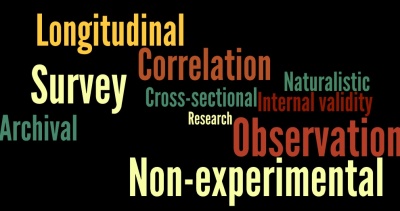Non-Experimental Research Methods
| [▲]Unit 3: Nonexperimental Research Methods | |
|---|---|
| Nonexperimental Research Methods | Unit 3 Overview | Unit 3 Outcomes | Unit 3 Resources | Correlational Research | Naturalistic Observation | Archival Research | Case Studies | Quasi-Experimental Research | Cross-sectional Research | Longitudinal Research | Survey Research | Common Threats to Internal Validity | Activities and Assessments Checklist | Practice Assignment 2 | Practice Assignment 3 |

|
Overview
Now that you have completed Units 1 and 2, it is time to turn to a diverse collection of research methods collectively referred to as nonexperimental research methods. Unlike experimental research methods, nonexperimental research methods do not permit the researcher to reach definitive causal conclusions. However, this does not mean that this set of techniques is inferior in any general sense, as nonexperimental research provides the researcher with a number of alternative ways of exploring the relationships among the variables in question. Thus, it is more useful to think of nonexperimental and experimental research methods as different tools within a researcher's toolkit - each method is designed to address a different type of problem or question. Moreover, it is often the constraints of the situation that dictate which tools are available (practical, ethical, or possible) for use.
There are two practice assignments associated with Unit 3. Practice Assignment 2 prepares you to properly interpret the results of correlational research whereas Practice Assignment 3 builds on your earlier work from Practice Assignment 1 to develop and refine the specifics of your nonexperimental research project. With this in mind, you should pay special attention to the sections in Unit 3 and Chapter 7 of your textbook that discuss Naturalistic Observation and Archival Research.
The topics to be covered in this unit are:
- Correlational Research
- Naturalistic Observation
- Archival Research
- Case Studies
- Quasi-Experimental Research
- Cross-sectional Research
- Longitudinal Research
- Survey Research
- Common Threats to Internal Validity